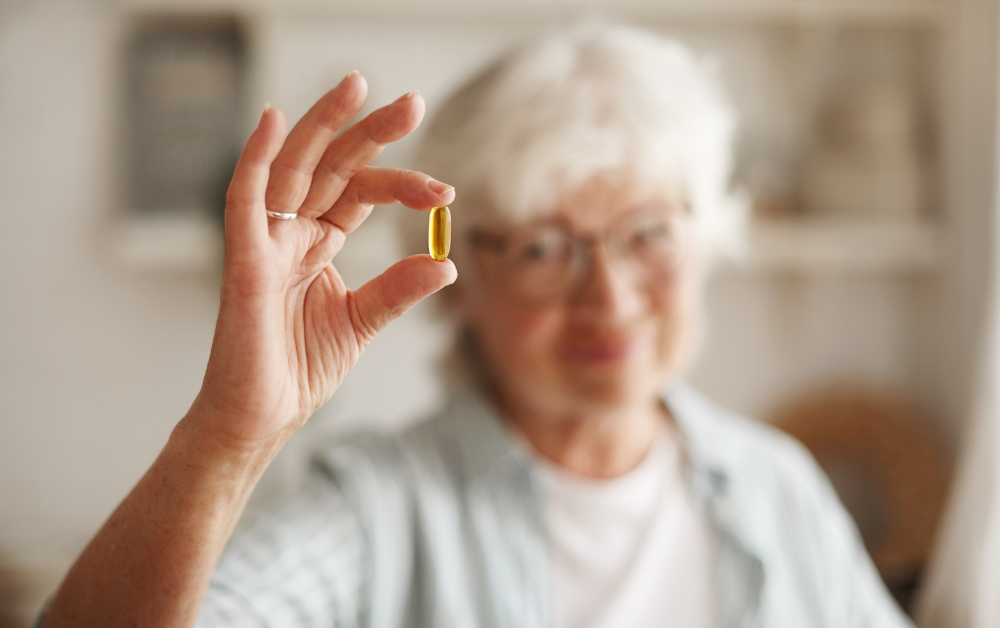Have you ever wondered why sunlight can lift your spirit? The answer lies behind the vitamin that can give you a sunny disposition.
Here’s how vitamin D can regulate your serotonin level and mood.
What is vitamin D?
Vitamin D often called the “sunshine vitamin,” is an essential fat-soluble nutrient for maintaining your health. Unlike most vitamins, vitamin D functions more like a hormone, and every cell in your body has receptors for it.
It plays a key role in regulating calcium and phosphate levels in your body, which keeps your bones, teeth, and muscles strong.
If you’re vitamin D deficient, you’re more at risk of developing conditions like:
- Osteomalacia
- Osteoporosis
- Heart disease
- Diabetes
- Certain types of cancer
What is serotonin?
Serotonin is a neurotransmitter in your brain that helps in facilitating communication between neurons. Sometimes called the “feel-good” neurotransmitter, serotonin is often linked to feelings of happiness and calm.
It influences several key functions in your body, particularly those related to the following:
- Mood
- Sleep
- Overall well-being
- Appetite
- Digestion
When your serotonin levels are balanced, you’re more likely to experience the following:
- Stable moods
- Restful sleep
- General sense of contentment
What happens if your serotonin level is high?
Although rare, high serotonin levels can lead to serotonin syndrome, a serious condition characterized by symptoms such as:
- Agitation
- Confusion
- Rapid heart rate
- Elevated blood pressure
What problems are associated with low serotonin levels?
Having a low serotonin level can lead to serious issues, such as:
- Depression
- Anxiety
- Sleep disturbances
- Appetite irregularities
The factors that contribute to low serotonin levels include:
- Vitamin D deficiency
- Inadequate diet
- Chronic stress
- Insufficient sunlight exposure
How does Vitamin D affect serotonin levels?
Vitamin D influences the synthesis and function of serotonin. According to research studies, vitamin D activates genes responsible for serotonin release.
How can vitamin D deficiency affect mood?
If your vitamin D levels are low, your body may have a hard time producing serotonin.
Since vitamin D and serotonin are connected, you may feel the following when you’re Vitamin D deficient:
- Fatigue
- General tiredness
- Impaired wound healing
- Feelings of depression or sadness
- Anxiety
Aside from these, research has also established a connection between low levels of vitamin D and the following conditions:
- Seasonal affective disorder (SAD)
- Chronic depression
- Mood disorders
How can you maintain an optimal vitamin D level?
The primary source of vitamin D is sunlight exposure, which stimulates the skin to naturally produce vitamin D. The optimal times for sunlight exposure are generally midday, around noon to 2 PM, when the sun is at its peak and you can maximize ultraviolet B (UVB) rays.
However, make sure that you protect yourself from too much sun exposure.
Safe sunlight exposure practices include the following:
- Limiting sun exposure time to prevent sunburn
- Wearing protective clothing
- Applying sunscreen after a brief period of sun exposure
In addition to sunlight, you can get vitamin D from dietary options such as:
- Fatty fish
- Fish oils
- Egg yolks
- Fortified foods
If you’re unable to achieve your vitamin D requirements through sunlight and diet, taking supplements can serve as an effective alternative.
The two primary types of vitamin D supplements are D2 (ergocalciferol) and D3 (cholecalciferol), with D3 often deemed more effective in elevating blood vitamin D levels.
Your dose can vary based on your:
- Age
- Diet
- Sunlight exposure
- Individual health conditions
Consult your healthcare provider for the recommended dosage as excessive vitamin D intake can be toxic.
Frequently asked questions
How does vitamin D influence serotonin levels?
Vitamin D can affect the brain by activating the synthesis of serotonin, a neurotransmitter that plays a significant role in mood regulation. Having adequate levels of vitamin D helps your body to produce optimal serotonin.
Can increasing vitamin D intake improve mood?
Yes, enhancing vitamin D intake can potentially improve mood by elevating serotonin levels. This improvement is particularly noticeable in individuals with low baseline levels of vitamin D.
What is the relationship between vitamin D deficiency and depression?
Research indicates a correlation between vitamin D deficiency and increased rates of depression. This deficiency may impair serotonin synthesis, which can negatively affect your mood.
How much vitamin D is required to positively affect mood?
The optimal amount of vitamin D to positively influence mood varies among individuals. Healthcare professionals recommend maintaining a serum level of 30 ng/mL to 50 ng/mL for general health, which includes mood regulation.
Are there specific forms of vitamin D that are more effective in regulating serotonin levels?
Vitamin D3 (cholecalciferol) is considered more effective than vitamin D2 (ergocalciferol) in raising and maintaining adequate blood levels, which in turn, supports serotonin synthesis and mood regulation.
Key takeaway
Vitamin D plays a vital role in regulating serotonin levels, which directly impacts your mood and overall mental well-being.
Ensuring sufficient vitamin D intake is a simple yet effective step toward a balanced mind and better emotional health. Maintain optimal vitamin D levels through sunlight, diet or supplements.
If you suspect a deficiency, take a quick vitamin D test from the comfort of your home and consult a healthcare provider to find the best approach for maintaining optimal levels.






















































